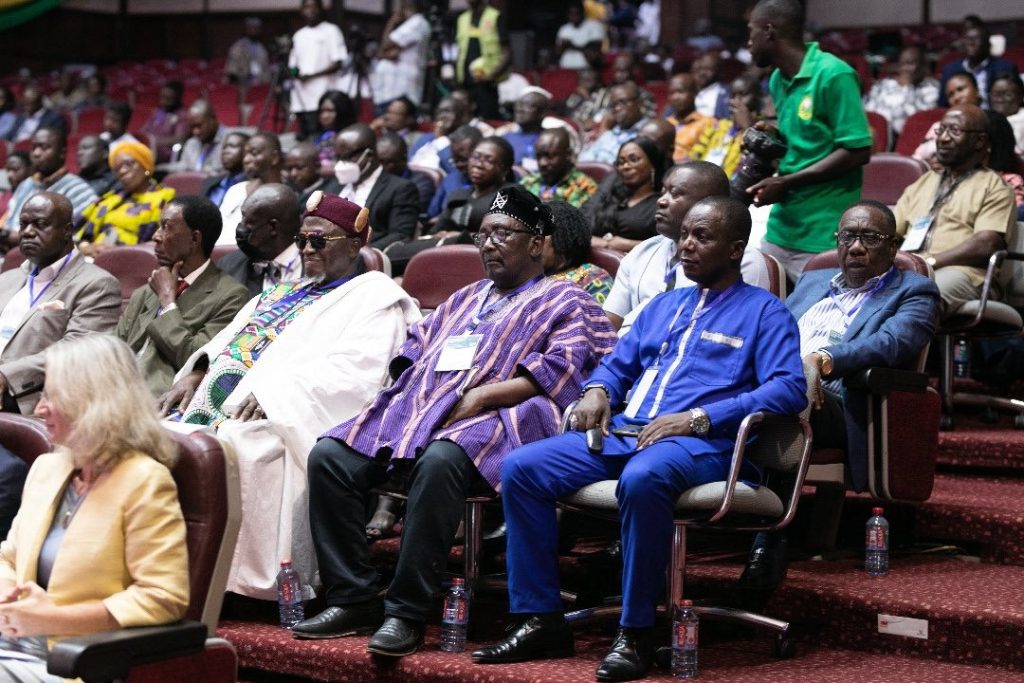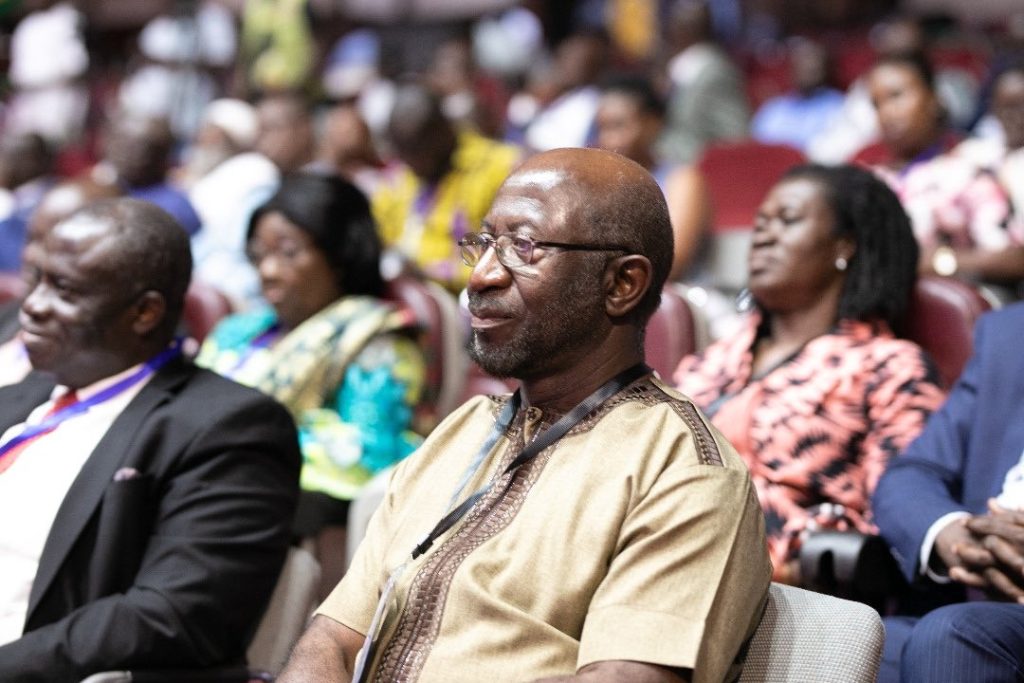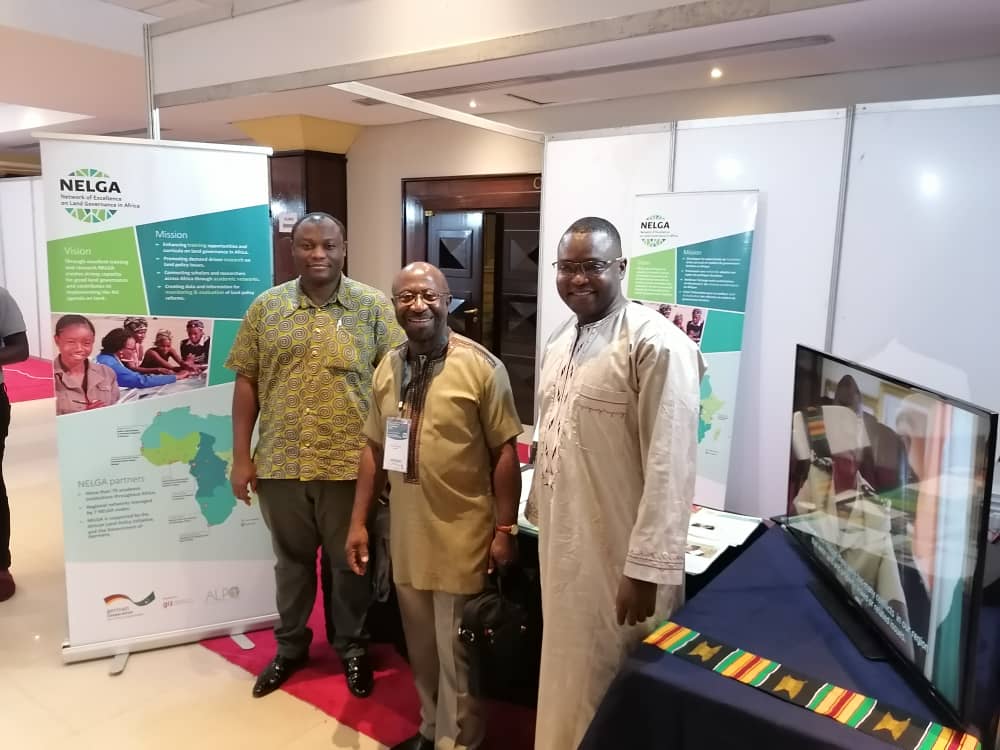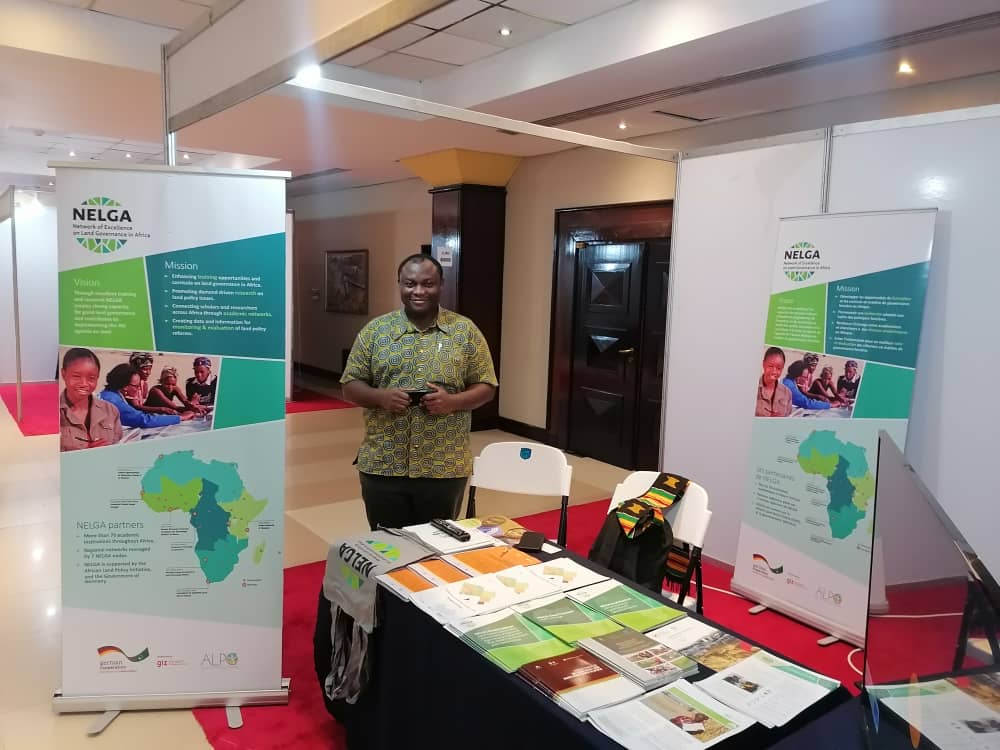Tag: Land Governance
Land Stakeholders Chart Course on Land Transformation in Ghana
From the 6th to the 9th of December, land stakeholders in Ghana will convene at the 2022 National Land Conference to institutionalize a structured arrangement for multi-stakeholder participation in the transformation of the land sector in Ghana.
The conference was organised under the theme – Leveraging National Land Policy, Legislation and institutional Capacity Towards Sustainable Socio-Economic Development by the Ministry of Land and Natural Resources and COLANDEF with the support of the German Development Cooperation, NELGA and other partners.
The conference creates the platform to discuss policy options and experiences, present new research and scalable innovations, foster high-level support and ownership of interventions to tackle land governance, and empower and develop the capacities of the land sector stakeholders. The Conference will establish a multi-stakeholder platform that will monitor the implementation of the conference’s recommendations, including the implementation of Ghana’s new national land policy and provide support for improving land governance and land administration in the country on a sustainable basis.
Click here to read more about the conference.







EAC Secretariat Capacity Enhanced to Address Land Governance Challenges
The African Land Policy Centre (ALPC) has enhanced the capacity of senior staff of the East African Community (EAC) Secretariat to facilitate the integration of land governance issues in programmes, especially those of the productive sector. The capacity-building workshop on implementing the AU Declaration on Land was held on 16 -17 August 2022, in Kampala, Uganda, under the auspices of a joint ALPC-EAC project which was endorsed by the EAC Council of Ministers of Environment and Natural Resources Management.
Emphasising the cross-cutting nature of land, ALPC Coordinator, Ms Joan Kagwanja, applauded the EAC secretariat’s participation at the senior level in the workshop, noting that capacities gained to integrate land governance issues in programmes will significantly advance EAC interventions in support of achieving objectives related to agriculture and food security; environment and natural resources; tourism and wildlife management; energy, infrastructural and industrial development; gender and women empowerment, among others. She further commended recent efforts and commitment to engage with the Partner States and establish a steering committee that will oversee the implementation of a road map, the first activity of which is the operationalisation of a platform for the exchange of knowledge and best practices among partner states. This is what is envisaged in the AU Declaration on Land.
This workshop draws on a recently validated capacity assessment study report conducted with the technical support of ALPC, which identified the need to enhance the capacity of the EAC Secretariat to better address land issues within EAC programmes. The assessment also noted a gap in knowledge platforms that would facilitate the exchange of best practices among Partner States, and identify emerging issues in order to design frameworks/mechanisms to address land issues, especially those that are transboundary in nature. The assessment also emphasised the role of the Network of Excellence on Land Governance in Africa in bridging these gaps. Capacity building modules touched on how to address land governance issues such as securing land rights for all land users, promoting responsible land based investments, preventing and addressing land and ethnic-based conflicts, improving women’s access to land/securing their land rights, and the central role of land use planning, effective land administration and information systems, the role of communication, among others.
Land Experts Validates Initiative to Advance the NELGA Project
Stakeholders in land governance have endorsed the process of establishing a five-year strategic plan (2023–2027) for the Network of Excellence on Land Governance in Africa (NELGA). The validation session on Zoom on August 11th, 2022, highlighted the road map for implementing the strategic plan to drive NELGA’s operations and ensure sustainability.
Joan Kagwanja, the African Land Policy Centre (ALPC) coordinator, UNECA, noted that NELGA’s accomplishments are indeed significant. We must build on these accomplishments and ensure clarity in administrative and programmatic actions within the network. She encouraged stakeholders to continue to support the expert team in developing the NELGA road map in developing systems that intersect and influence land policy formulation and implementation.
The gaps and challenges identified in terms of the strategic destination of NELGA will be addressed in the NELGA Strategy & Business Plan 2023- 2027, Communication and Visibility Strategy, Monitoring & Evaluation Framework 2023-2027 & Resource mobilisation strategy, which are set to be validated in 2022. Stakeholders at the meeting include NELGA coordinators, the ALPC, GIZ African Union Strengthening Advisory Capacity for Land Governance in Africa (SLGA) Program, and other land governance experts.
NELGA Holds Bi-Annual Planning Meeting with Stakeholders
The Network of Excellence on Land Governance in Africa (NELGA) and its regional and technical nodes are meeting virtually on Tuesday, 30th of March 2021, under the African Land Policy Center (ALPC). The planning meeting is a bi-annual event where land governance stakeholders review the next steps towards meeting the AU agenda on land in research, policy reform, and capacity building. The technical planning meeting is part of the continental program comprised by ALPC, NELGA, and GIZ, including land governance technical experts, academics, and key stakeholders, tasked with providing program oversight and recommendations that influence land governance reforms in Africa. The upcoming meeting is expected to bring together diverse stakeholder representatives from PLAAS, DAAD, Kwame Nkrumah University of Science and Technology, Namibia University of Science and Technology (KNUST), Université Gaston Berger (UGB), Hassan II Institute of Agronomy and Veterinary Sciences (IAV), ARDHI University and the University of Yaoundé I.
Pour une amélioration des curricula sur la gouvernance foncière en Afrique Centrale: NELGA Afrique centrale organise un atelier de sensibilisation sur la révision des programmes d’enseignement en matière de gouvernance foncière
Du 10 au 13 novembre 2020, des experts en gouvernance foncière et des universitaires issus des principales universités et institutions académiques du Cameroun se réuniront dans la ville universitaire de Dschang pour examiner la nécessité de disposer des curricula actualisés sur la gouvernance foncière qui tienne compte du contexte africain et qui soit en étroite ligne avec les recommandations de l’Union Africaine en matière de gouvernance foncière.
La réunion est organisée par le Réseau d’excellence sur la gouvernance foncière en Afrique (NELGA), qui est coordonné par le Centre africain de politique foncière (ALPC) avec le soutien du ministère fédéral allemand de la coopération économique et du développement (BMZ) auprès de l’Union africaine, sur le thème “Lignes directrices pour l’élaboration des curricula sur la gouvernance foncière en Afrique”.
La réunion est la résultante de la volonté de universités partenaires à NELGA Afrique centrale d’obtenir un soutien et des conseils dans la révision et la conception des programmes d’études sur les questions de gouvernance foncière. Il est alors nécessaire de sensibiliser ces universités sur les directives conçues par l’Union Africaine en matière de révision des curricula afin d’aligner les programmes d’enseignement sur les politiques stratégiques de l’Union africaine.
L’Université de Yaoundé I via le réseau NELGA en étroite collaboration avec ses universités partenaires ont envisagé le présent atelier de sensibilisation/formation afin de doter les responsables universitaires d’Afrique centrale des outils et connaissances nécessaires à la révision de leurs programmes d’études sur le foncier tout en s’assurant de la conformité de ces programmes avec les lignes directrices de l’Union africaine.
La gouvernance foncière est associée à la gestion de plusieurs autres ressources connexes qui pourraient propulser la croissance économique, la prospérité et le développement durable à grande échelle, d’une part, et les activités culturelles, d’autre part. La terre joue également un rôle prédominant dans la cohésion sociale, la paix et la sécurité.
Compte tenu du déficit observé dans le secteur du foncier en Afrique, notamment en matière de compétences et d’expertise, les États membres de l’Union Africaine ont été invités à “développer des capacités humaines, financières et techniques adéquates pour soutenir l’élaboration et la mise en Å“uvre de la politique foncière en Afrique”. Il a alors été recommandé aux universités et établissements d’enseignement supérieur d’examiner les programmes d’études, de recherche et de formation existants afin de déterminer s’ils sont adéquats pour répondre aux besoins de l’industrie. Des lacunes importantes ont été identifiées dans le contenu et la nature des programmes de formation et de recherche proposés par les universités et autres établissements d’enseignement supérieur africains.
Face à ce constat, le Centre Africain sur les Politiques foncières (ALPC – African Land Policy Centre) a élaboré en partenariat avec un groupe d’experts et d’académiciens africains les « lignes directrices pour le développement de programmes d’études sur la gouvernance foncière en Afrique ». Ce document a pour objectif de servir de cadre pour le développement et/ou la revue des curricula académiques des universités Africaines. Ces lignes directrices ont été présentées à l’organe politique compétent de l’UA pour approbation et sont ensuite devenu l’un des outils clefs de la mise en Å“uvre de l’agenda de l’UA sur le foncier.
À la fin de l’atelier, les universités de Dschang, Douala, Yaoundé, Cameroun, Université de Bangui en RCA, l’Université de N’Djamena au Tchad et Omar Bongo au Gabon commenceront à réviser le contenu des cours sur le foncier.
Executive Summary: Covid-19 and African Food Security Digital Seminar
On June 25, 2020, a digital seminar on “Covid-19 and African Food Security” was held by the Network of Excellence on Land Governance in Africa (NELGA) and the Institute for Poverty, Land and Agrarian Studies (PLAAS), University of the Western Cape (UWC), as the second in a series of seven monthly online seminars.

The onset of the Covid-19 crisis has fast-tracked the continent’s food security challenges. The virtual meeting brought together civil society activists and academics to discuss how the Covid-19 pandemic and the national lockdowns launched in response to it have affected food security in Africa.
With the disruption in food production and constraints in food value chains by several factors, including lockdowns, market closures, border closures, the briefing note below provides insight into these complex food security environments with key recommendations and actions for critical stakeholders.
This briefing note is based on a webinar that aired on Thursday, June 25, 2020, and is available to watch on the PLAAS YouTube channel here.
Youth Engagement for Global Action on Land Rights
Did you know that empowering young people through knowledge and information on land rights can reduce poverty rates and support the development of the African continent?
As the world celebrates the 2020 International Youth Day Edition, we must harness the untapped potentials in our youth as the continent has the largest concentration of young people in the world. It is essential to engage the African youth in knowledge building and encouraging creativity to rapidly transform the continent’s land situations as key for a
The global theme for #IYD2020 calls for Youth Engagement for Global Action; this is the time for African youth to improve their knowledge, advertise for youth-focused research and develop lasting solutions to land governance challenges on the continent. With good land governance and secure land rights, young people can help to stabilize their societies and create more opportuniti
Editorial Board Meeting
Call for applications for research fellowships under the “Network of Excellence for Land Governance in Africa (NELGA)” during the COVID-19 crisis.
The coronavirus (COVID-19) crisis has forced the world into action. The measures taken to contain the virus have impacted the whole of society, including the education sector, with research becoming more important than ever. To help investigating how COVID-19 and related measures potentially affect housing, land, and property rights in African countries, and to deliver high-quality research on the COVID 19 implications for land governance institutions and systems in the long-term, the German Academic Exchange Service (DAAD) offers support for special research fellowships under the “Network of Excellence for Land Governance in Africa (NELGA)” in the form of desk studies.
Applications for the NELGA research fellowships may be submitted throughout the year. For this specialized call we invite you to apply before the 15th of June 2020. The fellowship will be awarded for August 2020.
Download Application proceedures in English or French for more details.
Call for applications for research fellowships under the “Network of Excellence for Land Governance in Africa (NELGA)†during the COVID-19 crisis.
The coronavirus (COVID-19) crisis has forced the world into action. The measures taken to contain the virus have impacted the whole of society, including the education sector, with research becoming more important than ever. To help investigating how COVID-19 and related measures potentially affect housing, land, and property rights in African countries, and to deliver high-quality research on the COVID 19 implications for land governance institutions and systems in the long-term, the German Academic Exchange Service (DAAD) offers support for special research fellowships under the “Network of Excellence for Land Governance in Africa (NELGA)” in the form of desk studies.
Applications for the NELGA research fellowships may be submitted throughout the year. For this specialized call we invite you to apply before the 15th of June 2020. The fellowship will be awarded for August 2020.
Download Application proceedures in English or French for more details.
